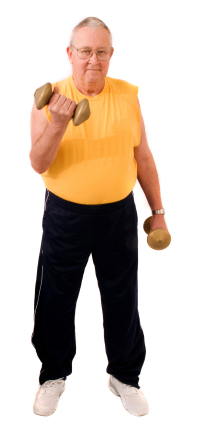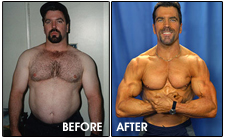|
Sarcopenia - Build Muscle to Combat this Scourge of Aging
by Scott Abbett |
A sixty-something year old buddy of mine said something funny to me the other day. He told me that when he was a younger man, he had "a really nice butt". Funny… I didn't even ask for that information; he just blurted it out when we were talking about body shape changes that normally accompany aging. He said that this particular bodily feature had been one of the things that attracted his wife when they were both young and as fresh as store-bought lettuce.
"Well, why don't you still have a really nice one?" I asked while only feigning ignorance of his probable answer. "GOA", he answered with a smile. "General old age." Now I'd heard it all. Here was a guy who only minutes before had admitted he'd spent the previous thirty years eating whatever he felt like in the moment while steering clear of any edifice resembling a gym. Now only in his early sixties, he laid blame for the loss of his previously athletic shape on only the passing of those three decades. Apparently, he didn't see the connections among his sedentary life, his ravenous intake of sugary foods, and the relentless conversion of his body into a soft and shapeless form. He also refused to see that he could turn it all around. There's a name for the condition that had relegated my buddy's "nice posterior" to the dust-heap of a nostalgic memory. It's call sarcopenia; the natural progression of muscle degradation with advancing age. It actually starts to occur at a nearly imperceptible rate after age 25 and accelerates on the other side of the 50 year mark. It's the reason that even when you get back down to your youthful body weight as a seasoned person, you don't necessarily regain that youthful shape. And like most other tell-tale signs of aging, the ravages of this scourge can be slowed down immensely with both a bit of effort and a bit of restraint. Let a lifetime of 'muscle building' prevent the muscle deteriortion that typically accompanies older age.The effort comes in the form of resistance training (bodybuilding) and the restraint comes from at least greatly reducing junk-food consumption, if not eradicating it completely. Bodybuilding is our best frontline defense in the fight to keep our muscles from deteriorating at a rate that can reach one pound a year after the age of fifty. Abstaining from foods devoid of antioxidants and high in destructiveness (glycation) can greatly reduce the overall age-related deterioration of our bodies. Following is a list of the basic steps you can take to greatly push back the onset of sarcopenia as you get older and wiser: • Utilize an effective bodybuilding/strength training program What most of us bodybuilders have known instinctively is finely becoming accepted in medical circles; namely, that aerobic exercise isn't enough for maintaining the health of aging adults. Resistance exercise (weight training) is absolutely essential. More highly developed muscles enhance protein metabolism and speed up resting metabolic rate. They also enhance posture, immune response, and bone strength. There's even new research showing that bigger muscles help stave off cancer and heart disease. Notice that I used the word "effective" bodybuilding and strength training program. I estimate that for every effective methodology for putting on natural muscle mass, there are probably a thousand that will provide you nothing but more wasted time. Nail down a routine that works. • Eat plenty of Protein with More Frequent Meals throughout the Day It surprises me how many people will allow their eating habits to cause their solid flesh to waste away. That's exactly what they're doing when they begin the morning with some toast and a glass of orange juice, eat a salad for lunch, and munch on some noodles in the evening. Where's the protein? Even those who get some with every meal are usually consuming inadequate amounts for muscle cell regeneration. Eat thirty to fifty grams of protein with each meal when building muscle through resistance training. Also, be skeptical of those who claim these high protein levels are bad for your kidneys. There's no empirical evidence that this is true for people with healthy kidneys. Your kidneys were designed for processing protein. • Eliminate or Greatly Reduce Sugar Intake I'll opt for some excess protein in my kidneys over excess sugar in my bloodstream any day of the week. Too much sugar can wreak havoc on our cells when it bonds with protein or lipid molecules. This creates a process called "cross-linking", resulting in a phenomenon known as ‘glycation'. Heavily cross-linked tissue (including the skin and nervous system) can also lead to accelerated loss of muscle. Your best defenses against this are to kick the high sugar habit and take a supplement called Carnosine. This dietary supplement has been shown to significantly reduce glycation in the body. • Stick with mostly Low Glycemic Carbohydrate Intake I grew up hearing the commercial that said "a day without orange juice is like a day without sunshine." For the longest time I thought: ‘Wow, missing either one of those must be bad'. Now I'm wondering if including either of those is good – especially the orange juice (sugar in a glass). If you want to keep more of your youthful muscles as you get older, eat mostly carbohydrates that are below 70 on the glycemic index. Not only will your muscles thank you for steering clear of the doughnuts and cheesecake, but your pancreas will function better too. This can lead to more control over blood sugar which will help eliminate body fat and keep your shape on the youthful side. That old saying "we are what we eat" is true, with a slight modification: "We are what we eat and do". Put efficient and effective bodybuilding to work for you and modify your eating habits to ward off sarcopenia. For doing this, your spouse or S.O. just might tell you you've still got a nice ‘you-know-what' even when you're well beyond sixty. |



